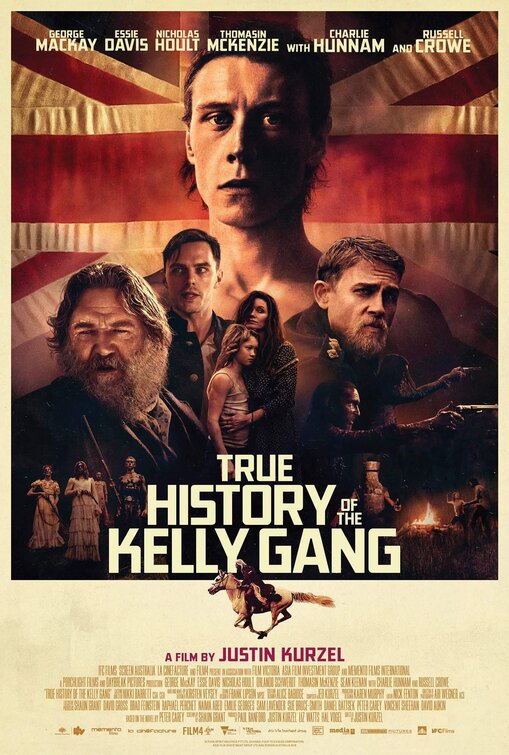Review: True History of the Kelly Gang
 Friday, April 24, 2020 at 1:00PM
Friday, April 24, 2020 at 1:00PM by Chris Feil
 For director Justin Kurzel, folklore goes hand in hand with with gorgeous brutality. After emerging with the true crime saga The Snowtown Murders and then the Fassbender double of Macbeth and Assassin’s Creed, Kurzel has established himself through a fascination with grisly legend, rending violence with stoic sheen and brooding male personas. His latest, True History of the Kelly Gang, is no different but somewhat more accomplished.
For director Justin Kurzel, folklore goes hand in hand with with gorgeous brutality. After emerging with the true crime saga The Snowtown Murders and then the Fassbender double of Macbeth and Assassin’s Creed, Kurzel has established himself through a fascination with grisly legend, rending violence with stoic sheen and brooding male personas. His latest, True History of the Kelly Gang, is no different but somewhat more accomplished.
The film follows the rise of the infamous Ned Kelly, a tale you might have seen in the many, many cinematic retellings. Here George MacKay plays the historical figure with crumbling psychosis. Instead of a detailed account of the actions of his band of outlaws, this version (adapted from Peter Carey’s novel by Snowtown’s screenwriter Shaun Grant) charts Kelly’s exploits from adolescence to execution, delivering more of a character study of Kelly as a psychological victim of British imperialism. Along the way is an ensemble of characters that oppose him in ways big and small, from The Babadook’s Essie Davis as his bitter mother, to Russell as Harry Power showing the preteen Ned his first brushes with violence, to Nicholas Hoult as the film’s dandy police officer villain Fitzpatrick.
This telling of the Kelly story segments his life, beginning with being sold to Power as a pseudo-apprentice in crime. The Kelly gang and their storied robberies does not appear until the third act, after a taste for rebellion and revenge results from the pressures of inequity and the family he returns to. In digging deep on Ned Kelly as a symbol, the film offers MacKay’s best work, shedding his previously bug-eyed screen presence in a performance of risk and spontaneity. This time, MacKay fuels his film’s palpable intensity, rather than responds to it vacantly.
For Kurzel, his penchant for ruminating in lore while leaning into a marshy visual flair has finally found a complementary home. Here all that masculine ferality that’s checkered his filmography takes root in larger societal ills. Using the downfall of one historical figure (in both true and fictionalized specifics), the dirty hands of colonialism build poverty, gender imbalance, and psychological warfare that can only result in violence. And in turn, it’s his most transfixingly beautiful film yet, blood smears and all.

Between its flashes with grisliness, the film plods delightedly across the psychological borders of gay panic and homoeroticism. Peekaboo nudity is about as common in the film as bloodshed. Kurzel positions the Kelly gang’s uniform of ladies’ dresses as instrumental to their subversion of British rule, but reserves much of the film’s most slavish obsession with male bodies to Hoult, its most prominent representation of that oppression. Hoult appears fireside on a chaise, donned only in garters and possibly flirts with the also sex-spent MacKay; later, he yanks it literally just out of frame. Like the influence of British rule, sex is explicit and suggestive all at once.
But on top of firming Kurzel’s filmmaking potential, the film’s ensemble (which also claims Thomasin MacKenzie and Charlie Hunnam) impresses throughout. Davis towers over her scenes, finding delicious, scabrous textures to a character that the script often reduces to shrewishness. But opposite MacKay’s animalistic Ned, Hoult delivers a cunning, complicated antagonist with the finesse and specificity that is becoming his signature.
History is also peppered with matter-of-fact anachronism and stagy visual tableaus to fresh but not overwhelming effect. It may not be all that illuminating of the legend itself (the gang feels almost like an afterthought in the grand scale of Kelly’s story) and you can feel a too-voracious slashing of narrative corners. Does it all amount to justifying yet another cinematic take on the material? It’s not revolutionary, but it is bountiful.
Grade: B
True History of the Kelly Gang is now available on VOD!



Reader Comments (4)
Kurzel is pretty fantastic with actors. Henshall and Cotillard would both be my supporting winners in their respective years for Snowtown and Macbeth. I am excited to see this as the cast is delicious and the idea of Crowe working with visionary directors makes me really happy.
If you know the sort of people in Australia who idolise Ned Kelly and what they'd think of their precious hero in a dress, then it bumps this up to a B+ !
Also the final scene (if I remember correctly) adds that extra meta text to the film.
So glad I got the chance to see this on the big screen (it was a direct-to-streaming release here, but got a very minor theatrical play in a couple of national cinemas). Easily the best Ned Kelly movie across over 100 years of cinema (Ned Kelly was the subject of the world's first ever feature film in 1906). Cinematic in some of its most fanciful and strange definitions.
Also, that poster is not good. The Australian version of fluero green was much more appropriate to its weird punk aesthetic.